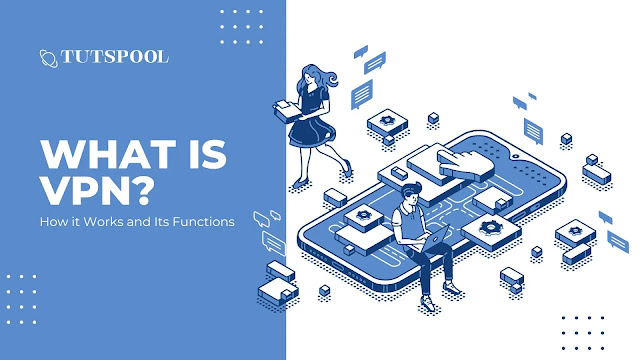Tutspool (03/09/2024). Surely you have ever found a site when surfing the internet that cannot be seen or is blocked.
Usually, to overcome something like this, you will immediately think about using a VPN.
But maybe there are also those who do not know what VPN is? How it works and what its function is.
So in this article, there will be an explanation of what VPN is, how VPN works and the function of VPN.
What is a VPN
VPN or Virtual Private Network is a virtual network that has the function of increasing network security and protecting personal information when surfing the internet.
This VPN first appeared from an employee who worked at Microsoft around 1996.
The purpose of VPN at that time was to connect two computers using the PPTP method or peer-to-peer tunneling protocol.
As time progresses and the internet develops, VPNs are now widely used by various groups to obtain a secure, private internet network connection.
In addition, VPNs can also access various sites that have been blocked in certain countries.
How VPN Works
The way VPN or Virtual Private Network works is to hide the IP address or Internet Protocol address.
The way to do this is by changing a connection path that will pass through a server owned by a VPN provider which is located in a different location.
This means that when you use the internet using a VPN, the server location of the VPN can be detected as the origin of your connection.
This means that internet service providers (ISPs), the government and third parties cannot see what websites you visit and/or what data you receive and send.
In short, VPN can change all data into a number, so that no one will be able to read your data.
They cannot possibly use the information contained within it.
Functions of VPN
Nowadays, many companies have used VPNs with the aim of allowing employees to access the network used by the office so that it can be used on employee laptops.
This is done so that the office network can recognize all incoming access from you.
Apart from that, it can also block access that does not originate from within the VPN network.
By using this VPN, you will get several benefits, most of which will be related to the security of your network connection.
Here are some of the advantages of using a VPN:
1. Open blocked websites
One of the advantages of using a VPN network is that it can open websites that are blocked by the government or internet service providers.
Examples of some blocked websites are Vimeo, Reddit, Imgur and many more that can be opened using a VPN network.
2. Securing identity
The next advantage of using a VPN network is that it can hide various types of activities that you do while using the internet network.
Data encryption from this VPN network can prevent third parties from being able to read information about you, where your internet access comes from, what you read and much more.
3. Securing data when on public networks
When you use a free Wi-Fi network either at school, on campus or on other public networks, you are indirectly connected to other people who are also using the same network as you.
By using a VPN network, it can help secure your device and your data from the threat of data theft when you use a public network.
4. Encrypt data
When you use a VPN network, all your personal data will be encrypted.
This encryption is a process of disguising data into random numbers and letters so that it cannot be read directly.
To be able to read this data, an encryption key will be required, this means that only a few parties can read your data.
5. Access regional content
This regional content will usually only be available in certain regions.
By using a VPN network, you can set your location to several regions so you can access and open regional content in that area.
An example of this is Netflix, which provides different films and TV series in each country.
If you use this VPN network then you can access and open content that may not be available in your country.
Advantages and Disadvantages of VPNs
Not only does it offer security for data when using the internet, but VPNs also have drawbacks.
This can happen because of the nature of VPN which can hide the identity of the original user by using a connection via a server located in another location.
Here are some advantages and disadvantages of VPN:
1. Advantages of VPN
- Personal information of users is kept safe
- Better connection security
- Can access a website that has been blocked
- Can open access to regional content
2. Disadvantages of VPN
- Internet speed is not good
- Internet connection is unstable
- There are limits to using a VPN
- Settings are done manually
In using this VPN, you can use it via smartphone or using a computer.
In the first step, you can download the VPN application either from your smartphone or your computer.
After finishing downloading you can create your VPN account first.
If you have successfully created an account, you will be directed to log in.
Once logged in, you can use your VPN.
Cover
After understanding the meaning of what VPN is, how VPN works, the function of VPN, as well as the advantages and disadvantages of VPN, hopefully you can clearly understand how to use VPN.Because basically VPN plays a very important role in protecting your personal data while you are using the internet.
If you really want your personal data to be safe, then start using a VPN now.
And if you are currently looking for website services, you can use Bikin.Website as a place to create your website.
Because this website creation service is very trustworthy and safe.







0 Comments